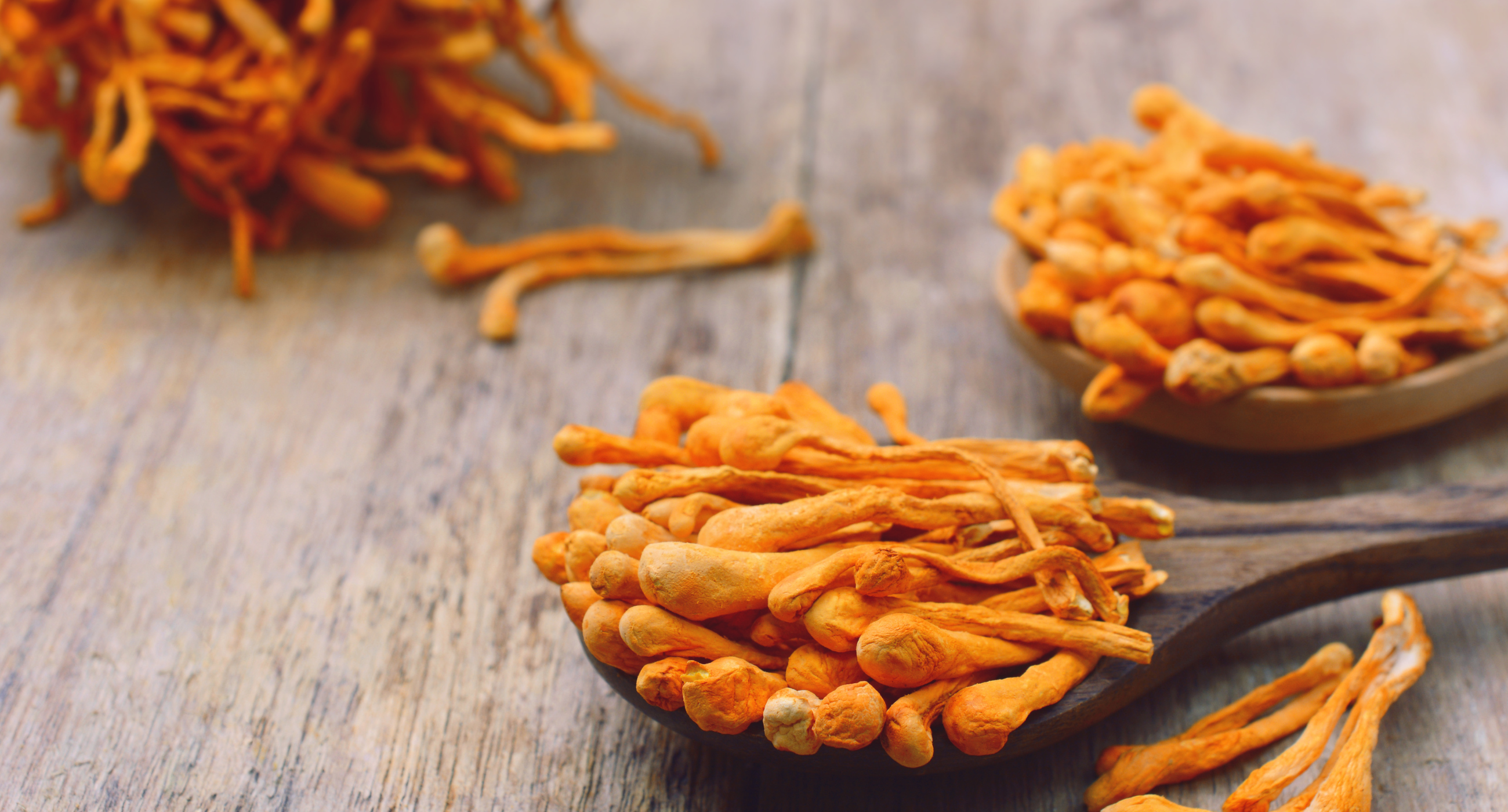
Cordyceps
Scientific Name: Cordyceps sinensis (now reclassified as Ophiocordyceps sinensis) and Cordyceps militaris
Herbal Profile: Cordyceps
Scientific Name: Cordyceps sinensis (now reclassified as Ophiocordyceps sinensis) and Cordyceps militaris
Family: Ophiocordycipitaceae
Common Names: Cordyceps, Caterpillar Fungus, Dong Chong Xia Cao (Chinese for "winter worm, summer grass")
Description:
Cordyceps is a type of parasitic fungus that primarily grows on the larvae of insects. Cordyceps sinensis is native to the Himalayan regions of Tibet and Nepal, as well as the high-altitude regions of China, while Cordyceps militaris is more widely distributed and can be cultivated. Traditionally, the fungus was harvested from wild insect hosts, but due to its rarity and high demand, most Cordyceps available today are cultivated in controlled environments. The fruiting body and the mycelium of Cordyceps are used in traditional medicine.
Traditional Uses:
Cordyceps has a long history of use in traditional Chinese and Tibetan medicine, where it is prized for its ability to enhance energy, stamina, and overall vitality. It is also known for its adaptogenic, immune-boosting, and anti-aging properties. Common traditional uses include:
- Energy and Stamina: Cordyceps is renowned for its ability to increase energy levels and endurance. It is traditionally used by athletes and individuals who need a boost in physical performance and stamina. This effect is believed to be due to its ability to improve oxygen utilization and increase ATP (adenosine triphosphate) production, which is the primary energy carrier in cells.
- Immune Support: Cordyceps is used to strengthen the immune system, helping the body to resist infections and recover from illnesses more effectively. It is believed to enhance the activity of natural killer (NK) cells and other immune cells.
- Respiratory Health: The herb is traditionally used to improve respiratory function and alleviate symptoms of conditions such as asthma, chronic bronchitis, and other lung-related issues. It helps by relaxing the bronchial walls, reducing inflammation, and increasing oxygen intake.
- Anti-Aging and Longevity: Cordyceps has been traditionally used as a tonic to promote longevity and reduce the effects of aging. Its antioxidant properties help protect cells from oxidative stress, which can contribute to aging and degenerative diseases.
- Sexual Health and Libido: In traditional medicine, Cordyceps is used as an aphrodisiac to enhance sexual performance and libido in both men and women. It is believed to improve reproductive health by increasing circulation and energy levels.
- Kidney and Liver Health: Cordyceps has been used to support kidney and liver function, particularly in traditional Chinese medicine, where it is believed to nourish the kidneys and protect the liver from damage.
Active Compounds:
- Cordycepin (3’-deoxyadenosine): A bioactive compound known for its anti-inflammatory, antioxidant, and anti-cancer properties. It is also believed to enhance energy production by influencing ATP synthesis.
- Polysaccharides: Contribute to the immune-boosting effects by enhancing the activity of immune cells and providing antioxidant protection.
- Sterols (Ergosterol): Compounds that have been shown to have cholesterol-lowering effects and support cardiovascular health.
- Adenosine: Known for its ability to increase blood flow and support cardiovascular health, as well as for its calming effects on the nervous system.
- Beta-Glucans: Polysaccharides that enhance immune function and have potential anti-tumor properties.
Preparation and Dosage:
- Capsules/Tablets:
- Powder:
- Tincture:
- Tea (Infusion):
- Dual Extraction (Alcohol and Water Extraction):
Safety and Precautions:
- Pregnancy and Breastfeeding: The safety of Cordyceps during pregnancy and breastfeeding has not been well-established. It is advisable to avoid its use during these times unless recommended by a healthcare provider.
- Autoimmune Diseases: Because Cordyceps can stimulate the immune system, it should be used with caution by individuals with autoimmune diseases (such as lupus, multiple sclerosis, or rheumatoid arthritis). Consult a healthcare provider before use.
- Medication Interactions: Cordyceps may interact with immunosuppressive medications and anticoagulants (blood thinners). It is important to consult with a healthcare provider if you are taking any medications or have underlying health conditions.
- Allergic Reactions: While rare, some individuals may experience allergic reactions to Cordyceps. Discontinue use if any allergic symptoms, such as skin rash or respiratory discomfort, occur.
- Gastrointestinal Upset: Some individuals may experience mild gastrointestinal symptoms, such as nausea or diarrhea, especially when starting Cordyceps supplementation. Start with a lower dose and gradually increase to minimize these effects.
Conclusion:
Cordyceps is a powerful medicinal fungus with a long history of use in traditional medicine for enhancing energy, supporting respiratory health, boosting immunity, and promoting longevity. It is particularly valued for its adaptogenic and antioxidant properties, making it beneficial for overall health and wellness. While generally considered safe for most people, it is important to use Cordyceps responsibly and consult a healthcare professional, especially if you are pregnant, breastfeeding, have underlying health conditions, or are taking medications.
